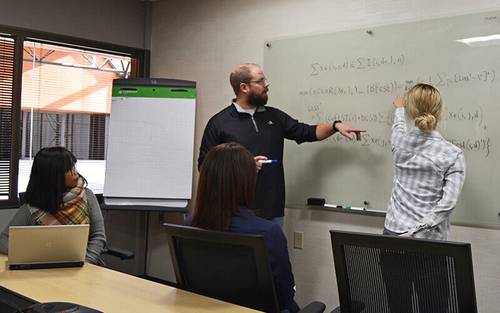Characteristics of the 5 generations in the workplace


By The Schneider Guy
Never before have we had five generations in the workforce. This recent change is resulting in a more diverse work environment with the potential for new opportunities and challenges to arise.
At Schneider, I work for Corporate Recruiting, a team that has associates from four different generations. As a team, we are always trying to stay up-to-date and educated on who is entering the workforce. What we’ve learned is that each generation has its own ideas, opinions and perspectives, making each one unique from the others.
To ensure generations can work together toward the same goal in the workplace, we need to acknowledge, appreciate and respect our differences. In order to do this, we must first understand what distinguishes each generation and what each one has to offer.
Traditionalists
Traditionalists were born before 1945 and lived through the Great Depression and World War II. They saw the rapid migration from farm to city, value guidance of experts (do not question authority) and have an extremely strong work ethic.
Facts about Traditionalists
- Prefer to communicate either in person or via print
- Do not question decisions made by leaders - considered insubordination
- Do not expect a lot of feedback and do not give it - no news is good news
- Use story telling for transfer of knowledge
- Prefer to stay with the same employer from hire to retire - loyalty is rewarded with better jobs and pay
- Feel top-down management builds large, successful organizations
Baby Boomers

Baby Boomers were born between 1946 and 1964 and grew up as the most optimistic generation in American history. They believe in the American Dream, have high expectations and lived through the greatest economic boom in history, including the invention of the television.
Facts about Baby Boomers
- Prefer to communicate in-person or via phone.
- Don’t generally disagree with leaders, but instead create committees and surveys to gain information, summarize the data and present to leaders
- Believe in formal feedback with fair and consistent processes
- Prefer knowledge transfer by story telling
- Change jobs earlier in career for promotions and focus on stability later
- Believe things are done a certain way and consider it policy
Generation X
Gen X-ers were born between 1965 and 1980 and are considered realists. Gen X’ers saw the rise of technology and change, and lived through multiple recessions, global competition and the Vietnam War. These events created a generation of individuals skeptical of organizations, politics and the news. They focus on life outside of work, making a work-life balance of utmost importance.
Facts about Gen X-ers
- Tend to communicate via email and check their sources via internet
- Believe the person with the best skills and most experience should make decisions
- Think real-time feedback is critical to getting work done efficiently
- Document learnings and post them to the internet so others can find it
- Get ahead in their careers by leaving companies and coming back later for promotions
- Feel rules were made to be broken and it is easier to ask for forgiveness than permission
Generation Y (also known as Millennials)

Millennials were born between 1981 and 2001 and lived through terrorist attacks, such as the 9/11 attacks, multiple school shootings and scandals, as well as the Great Recession. They are the first generation to grow up in the world of technology instead of learning at a later age. Millennials want to make a difference in their work place and are willing to change jobs to fulfill that desire.
Facts about Millennials
- Like to communicate via text and forms of social media, however, the majority prefer to communicate in-person while at work.
- Make decisions in teams without any one person being in charge
- Grew up with constant feedback and prefer real-time feedback to adjust quickly
- Prefer video as form of knowledge transfer
- Will leave a company for more pay, more meaningful work and career advancement
- Think of policies as guidelines
Generation Z
Gen Z-ers are born after 2001 and are the newest generation in the workforce. They are known as digital natives and do not know of a world without the internet. Gen Z-ers are very entrepreneurial, seeing companies like Uber and Airbnb thrive by using an individual’s own time and resources to make money.
Facts about Gen Z-ers
- Use Snapchat and Instagram as their main forms of social media
- Watch videos and live chats for communication transfer
- Are considered to be the “always on” generation
- Want to make the world a better place and have a ‘global’ mindset
Generations at Schneider
At Schneider, we see all five generations working together to accomplish the same goal. Our associates are encouraged make connections with one another through the various networking opportunities available.
For a workplace to be successful, its associates must value the diversity and respect the differences each generation brings. From my Gen X-er perspective, Schneider associates are doing just that!
Why Schneider?
Apply to an industry-leader where you’ll have the opportunity to network and connect with fellow associates who come from different backgrounds than you do.

Schneider Guy loves the "Big Orange." He's passionate about the trucking industry and connecting people to rewarding careers within it. He's been the eyes and ears of our company since our founding in 1935, and he's excited to interact with prospective and current Schneider associates through "A Slice of Orange."



